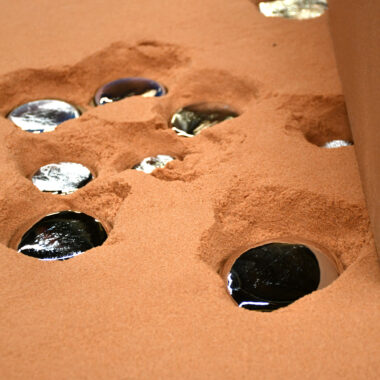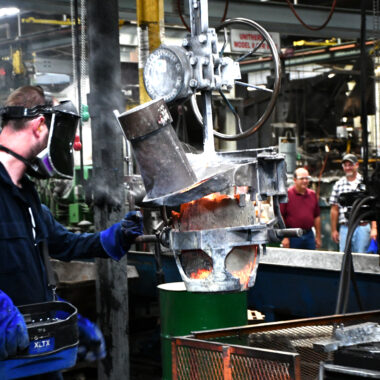Boost Your Craft: Expert Insights into Casting Aluminum
Boost Your Craft: Expert Insights into Casting Aluminum
Blog Article
Light Weight Aluminum Casting Services Introduced: Essential Insights and Tips
Exploring the realm of aluminum spreading solutions can introduce a globe of detailed procedures and nuanced considerations that are critical for effective results. As we venture into the realm of aluminum spreading services, prepare to discover the vital components that can form the trajectory of your tasks and raise your understanding of this intricate craft.
The Fundamentals of Aluminum Casting
What essential processes are associated with aluminum spreading that form the foundation of this extensively used manufacturing technique? Light weight aluminum spreading is a affordable and functional approach utilized in various markets to produce complex and elaborate steel components. The process starts with the melting of aluminum ingots in a heater, generally at temperatures ranging from 1220 ° F to 1670 ° F, depending upon the specific aluminum alloy being made use of. As soon as molten, the light weight aluminum is poured right into a pre-designed mold and mildew cavity, where it solidifies and takes the form of the mold.
After solidification, the mold and mildew is eliminated, and the casting goes through ending up processes such as warmth machining, therapy, and surface finishing to meet the called for requirements. Understanding these basic procedures is essential for attaining top quality aluminum castings with accurate measurements and mechanical homes.
Various Casting Techniques Discussed
Checking out the various methods utilized in light weight aluminum casting provides useful insights into the varied approaches utilized to attain exact and complex metal parts. One usual approach is sand spreading, where a mold and mildew is produced using compressed sand around a pattern of the preferred component. One more method, pass away spreading, entails infusing molten aluminum into a steel mold and mildew under high pressure.
Factors to Think About When Choosing a Company
When picking an aluminum spreading company, evaluating their experience and knowledge is crucial for ensuring high quality and reliability in the manufacturing process. The company's experience in the area shows their knowledge with different spreading methods, potential obstacles, and ideal methods. It is vital to inquire about the types of tasks they have serviced in the past, ensuring they align with the complexity and specs of your very own job.
Additionally, think about the copyright's track record within the sector. Search for testimonials, reviews, and case researches that demonstrate their ability to provide high-grade aluminum castings constantly. A reputable supplier will certainly typically have certifications or associations with market organizations, showcasing their commitment to quality and adherence to market standards.
Moreover, analyze the copyright's capacities in regards to personalization, volume demands, and project timelines. Make sure that they can accommodate your particular requirements and have the flexibility to range manufacturing as called for. Efficient interaction and openness regarding costs, lead times, and high quality control procedures are additionally crucial elements to consider when selecting a light weight aluminum casting provider.

Usual Obstacles and Solutions
Browsing via the complexities of light weight aluminum casting processes typically offers producers with a collection go to my blog of obstacles that need ingenious remedies to guarantee efficiency and quality in manufacturing. One usual obstacle encountered in aluminum casting is the formation of issues such as porosity, contraction, or inclusions because of inappropriate mold and mildew style or inadequate metal quality. These flaws can content jeopardize the structural honesty of the end product. To address this, makers should perform extensive simulations and tests to optimize the spreading process parameters and make certain the quality of the mold and mildews and materials made use of.
Executing sophisticated technologies like computer-aided style (CAD) and computer numerical control (CNC) machining can boost accuracy and consistency in aluminum spreading. By spending in automation and real-time monitoring systems, producers can enhance process control and lessen variations, ultimately enhancing the general top quality of light weight aluminum actors products.
Tips for Optimizing Your Casting Projects
By guaranteeing that the gating system is well-designed and appropriately placed, you can enhance the flow of liquified aluminum and reduce the possibilities of flaws in the last casting. In addition, utilizing computer simulations can aid in anticipating and assessing the flow of metal throughout the casting process, enabling for changes to be made before actual manufacturing begins.

Final Thought
To conclude, recognizing the fundamentals of aluminum spreading, different casting techniques, variables to think about when picking a company, usual difficulties and services, and suggestions for optimizing spreading tasks are crucial for effective outcomes. By sticking to these insights and implementing best companies, individuals and practices can make certain effective and effective light weight aluminum casting solutions his response that meet their particular requirements and demands.
Understanding these basic procedures is important for achieving top quality light weight aluminum castings with mechanical residential properties and specific measurements.
When choosing a light weight aluminum casting service company, assessing their experience and proficiency is essential for ensuring high quality and integrity in the production process. Efficient communication and openness concerning prices, lead times, and top quality control procedures are additionally essential aspects to take into consideration when selecting an aluminum casting solution company.
Navigating through the complexities of aluminum casting processes often provides producers with a series of challenges that need ingenious remedies to make sure effectiveness and top quality in manufacturing. One common challenge encountered in light weight aluminum casting is the development of defects such as porosity, shrinkage, or inclusions due to improper mold and mildew design or poor steel top quality.
Report this page